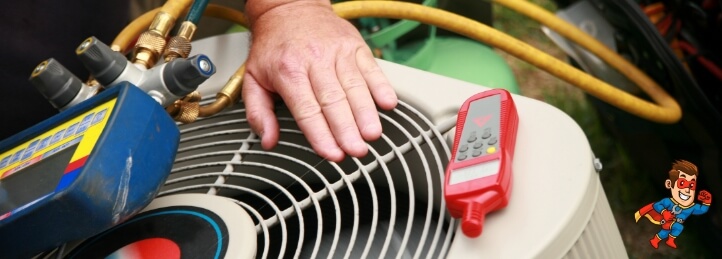Maintenance in Wylie, TX

It’s clear how much we depend on our air conditioners and heating systems here in Texas. We advocate for customers to save money in a variety of ways, including seasonal maintenance. Help your air conditioner or heating system last for longer and avoid breakdowns with essential yearly maintenance performed by a licensed contractor from Mr. Air Repair in Wylie, TX.
- We take pride in what we do
- Available 24/7 for emergency services
- Knowledgeable and friendly staff
Maintenance is proven to reduce repair needs, extend a system’s lifespan, and even lower monthly bills over time with early adjustments and improvements to your home comfort system.
Contact Mr. Air Repair for yearly, routine maintenance. Family serving family!

Seasonal Maintenance: A Smart Move for Texas Homeowners
In Texas, where temperatures swing from sizzling summers to unpredictable winter chills, your HVAC system works overtime to keep you comfortable. Yet, like any hardworking machine, your heating and cooling system needs regular care to keep it running efficiently. That’s where seasonal HVAC maintenance comes in.
Whether you’re braving a 105°F afternoon or a cold front in the winter, staying ahead of HVAC issues with seasonal maintenance isn’t just good practice. It’s a money-saving, comfort-boosting decision.
Here’s why routine HVAC check-ups should be part of your home maintenance plan in the Lone Star State.
Improve System Efficiency Year-Round
Your HVAC system loses efficiency over time, especially when it runs non-stop through long Texas summers. Dust, pollen, and dirt buildup on coils, filters, and other components can restrict airflow and force your system to work harder.
With seasonal maintenance, technicians inspect and clean critical parts, replace air filters, lubricate moving components, and ensure everything runs as it should. This reduces energy waste and helps your system cool and heat your home using less power, translating to lower monthly bills and fewer breakdowns.
Reduce Utility Costs: Even During Peak Seasons
High energy bills are a fact of life in Texas summers. But they don’t have to skyrocket. An HVAC unit in peak condition uses significantly less energy than one that’s neglected.
According to the U.S. Department of Energy, homeowners can save up to 15% on their energy bills just by maintaining their HVAC system. That’s real money back in your pocket during the months when air conditioning runs almost constantly. Seasonal maintenance ensures you’re not throwing money away due to an inefficient system.
Prevent Costly Repairs and Emergency Breakdowns
There’s never a good time for your AC to stop working, but when it fails during a 100°F day in Austin, it can quickly become a safety issue. Emergency repair costs are not only inconvenient but also expensive, especially during peak demand periods.
Seasonal maintenance helps catch small problems before they turn into major repairs. Technicians can detect worn parts, refrigerant leaks, or electrical issues early, giving you the chance to fix them on your schedule, not when you’re in crisis mode. This proactive approach can save hundreds or even thousands in unexpected repair costs.
Extend the Lifespan of Your HVAC System
Your HVAC system is one of the biggest investments in your home. Just like regular oil changes help your car run longer, routine HVAC maintenance keeps your system operating at its best for years to come.
Most HVAC units last 10 to 15 years, but only if they’re properly cared for. Without maintenance, you could be looking at a full system replacement far earlier than expected. By scheduling professional tune-ups in the spring and fall, you extend the life of your equipment and maximize your investment.
Protect Indoor Air Quality
Texas is known for its heavy pollen counts in the spring and ragweed in the fall. If your HVAC system isn’t properly maintained, it can circulate dust, allergens, and even mold spores throughout your home.
Seasonal service includes replacing air filters, inspecting ductwork for debris, and cleaning coils that can harbor bacteria or mold. This helps keep the air in your home cleaner and safer, especially for households with allergies, asthma, or young children.
Ensure Your Home Stays Comfortable No Matter the Weather
Whether you’re trying to beat the heat in San Antonio or warm up during a surprise cold snap in Fort Worth, you need a system you can rely on. A poorly maintained HVAC unit may struggle to keep up, leading to uneven temperatures, weak airflow, or cycles that never seem to end.
By scheduling maintenance before each major season, typically spring for your AC and fall for your heating system, you ensure your equipment is ready for what’s ahead. No scrambling for appointments, no suffering through sweltering afternoons or chilly mornings.
Stay in Compliance with Manufacturer Warranties
Many HVAC manufacturers require regular maintenance to keep warranties valid. If your system fails and you haven’t kept up with service, you may find yourself footing the bill for parts and labor that would otherwise be covered.
Having proof of seasonal tune-ups can help you maintain warranty coverage, an added layer of protection for your system and your wallet.
Enjoy Peace of Mind All Year Long
When you invest in seasonal HVAC maintenance, you’re not just caring for equipment; you’re protecting your family’s comfort and safety. Knowing your system has been professionally inspected gives you confidence that you’re prepared for the weather ahead.
Many Texas homeowners opt for annual maintenance plans, which include scheduled service visits, priority scheduling, and discounts on repairs. It’s a convenient way to take HVAC care off your to-do list and avoid surprises down the road.
Schedule Your Seasonal Tune-Up Today
Don’t wait for a breakdown to realize your HVAC system needs attention. Scheduling seasonal maintenance is one of the simplest and smartest ways to improve energy efficiency, reduce long-term costs, and stay comfortable through every Texas season.
Whether it’s spring AC prep or fall furnace checks, our expert technicians are here to keep your home running smoothly. Book your appointment today and stay ahead of the Texas weather curve.
How Maintenance Extends the Lifespan of Your AC
Most central air conditioning systems are designed to last for 10 to 15 years. However, the reality is that how long your AC lasts depends heavily on how well it’s maintained. Skipping regular service can significantly reduce its life expectancy.
Here’s how proper maintenance supports longevity:
- Reduces Wear and Tear on Components. Your AC system has multiple moving parts—compressors, motors, fans, and belts—all of which wear down with use. When these components aren’t inspected, cleaned, or lubricated, they degrade faster and strain the entire system. Regular tune-ups catch wear early and help extend each part’s life.
- Improves Cooling Efficiency. When your AC system is clean and all parts are operating at full capacity, it doesn’t have to work as hard to keep your home cool. A system that runs efficiently experiences less stress, which lowers the chance of overheating and premature failure.
- Prevents System Overloads. Dirty coils, clogged filters, and low refrigerant levels can all force your AC to overwork. This can lead to overheating or short cycling, when your AC turns on and off too frequently, both of which put the system under extreme stress. Maintenance addresses these issues before they cause damage.
- Promotes Even Cooling. Neglected AC units often fail to deliver consistent, even cooling throughout your home. Uneven cooling can cause certain components to cycle more than others, leading to an imbalance that shortens the unit’s overall lifespan. Balanced airflow and even temperatures ensure the entire system operates in sync.
Repairs Prevented by Routine AC Maintenance
Skipping AC maintenance doesn’t just reduce your system’s lifespan, It also invites costly, avoidable repairs. Here are some of the most common issues that maintenance helps prevent:
- Frozen Evaporator Coils. One of the most common AC problems is frozen evaporator coils. This usually happens due to restricted airflow caused by dirty filters or low refrigerant levels. During a maintenance visit, technicians clean filters and check refrigerant pressure to prevent freezing, which can damage coils and compressor components over time.
- Clogged Condensate Drains. Your AC produces moisture that drains away through a condensate line. Over time, this drain can clog with dirt, algae, or debris, leading to water leaks and potential water damage. Technicians clear out the line during maintenance to keep moisture flowing freely.
- Electrical Failures. Wiring issues and failing capacitors are often caused by heat, age, or loose connections. If left unchecked, these can lead to a complete system failure or even electrical hazards. Routine inspections catch these issues early, often replacing parts before failure occurs.
- Compressor Damage. The compressor is the heart of your air conditioner—and one of the most expensive parts to replace. Low refrigerant, overheating, or system strain can lead to compressor failure. Maintenance ensures the compressor is running under optimal conditions and that nothing upstream is putting it at risk.
- Fan Motor Burnout. If dirt accumulates on the fan blades or the motor becomes unbalanced, it may start to overheat or vibrate excessively. Over time, this can cause the motor to fail. A seasonal tune-up includes cleaning and lubricating the fan components, keeping the motor running smoothly.
- Refrigerant Leaks. Refrigerant is essential for cooling, and a leak not only compromises system performance but can also harm the environment. Technicians check for signs of leakage, ensuring your system operates efficiently and legally. If caught early, small leaks can be repaired without requiring major component replacements.
- Capacitor and Contactor Failures. These electrical components control the start and run cycles of your AC. When they go bad, your system may not start at all. During a maintenance visit, technicians test these components and often replace them proactively to prevent sudden failures.
What’s Included in a Standard AC Maintenance Visit?
A typical air conditioning maintenance service includes:
- Cleaning and replacing air filters
- Inspecting and cleaning evaporator and condenser coils
- Checking refrigerant levels
- Inspecting electrical components (capacitors, contactors, wiring)
- Lubricating moving parts (fan motor bearings, etc.)
- Cleaning the condensate drain line
- Checking thermostat calibration
- Evaluating system performance (airflow, temperature split, etc.)
Each of these steps plays a role in extending your AC’s lifespan and preventing costly repairs.
Maintenance Pays for Itself
While regular maintenance does come at a small cost, it more than pays for itself by reducing energy bills, preventing expensive repairs, and delaying the need for full system replacement.
In fact, a well-maintained AC system can operate up to 30% more efficiently, last several years longer, and avoid hundreds to thousands of dollars in emergency repair costs. Compared to the expense and disruption of a major breakdown in the middle of a heatwave, preventive maintenance is a no-brainer.
Benefits of the Mr. Air Repair Plan
Here’s specifically what you can expect from our handcrafted maintenance plan that’s designed to maximize customer benefits:
- Mr. Air Repair’s Protection Plan or Mr. Air Repair’s Maintenance Plan
- Full HVAC System Inspection
- Enhanced Indoor Air Quality
- Extended System Lifespan
- Peace of Mind
Give us a call today to learn more or enroll in our maintenance program.

Protect Your Investment: Schedule AC Maintenance Today
Your air conditioner works hard for you, especially in hot, humid Texas summers. Give it the care it deserves. Regular maintenance is the smartest, most affordable way to extend your system’s life, ensure peak performance, and avoid costly repairs.
Contact our team today to schedule your seasonal AC tune-up or learn more about our annual maintenance plans.
A little care now can save you a lot later, and keep your cool all season long.
